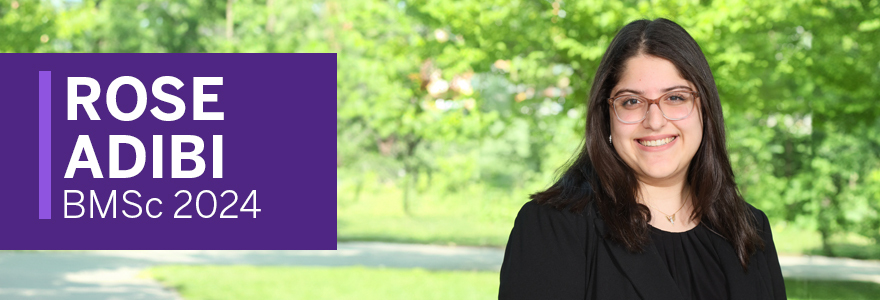BMSc grad seizes opportunities to learn from leaders and guide young students

By Natalie Ebel
“The delicate balance of mentoring someone is not creating them in your own image but giving them the opportunity to create themselves.”
- Steven Spielberg
This quote strikes a chord with BMSc graduate Rose Adibi. For the past four years, Adibi has been mentored by professors and graduate students who have helped guide her way forward.
Throughout her schooling, Adibi took advantage of research opportunities and completed the Interdisciplinary Medical Sciences (IMS) program, both of which introduced her to valued mentors along the way. Inspired by their resilience, empathy and guidance, Adibi tackled the role of mentor herself, working with elementary school students with learning disabilities and serving as a Residence Soph for Western’s Orientation Program.
Today, Adibi graduates from the Bachelor of Medical Sciences program. As she heads into a master’s program in biotechnology this summer, Adibi is excited to take on new leadership roles and mentorship opportunities while continuing to learn from leaders in the medical field.
Read more about Adibi’s experience and ambitious career plans.
What inspired you to complete the IMS modules as part of your BMSc program?
During the first three years of my BMSc program, I delved into challenging scientific subjects like microbiology, immunology, cell biology, genetics and organic chemistry. While I appreciated learning about these complex topics, I felt a desire for change. I wanted to develop my leadership and interpersonal skills while exploring different areas of study, rather than focusing solely on one field. The IMS program was exactly what I was looking for. It gave me the chance to broaden my knowledge by taking courses from different fields and enhance my abilities in leadership and teamwork through a Community Engaged Learning (CEL) course.
Which IMS modules did you choose to study and why?
For my capstone, I chose MEDSCI 4995E, a CEL course where students work together with community partners. My team and I partnered with Nokee Kwe, an Indigenous not-for-profit organization that provides educational and employment resources to individuals of all backgrounds. I chose the CEL course because I wanted an opportunity to manage my own community project and play a role in helping marginalized communities. The opportunity was truly unique and something I’ve never done before. In addition to my capstone course, most of the courses I took were from the Microbiology and Immunology Department because I am very interested in the intricacies of the immune system and the mechanistic pathways that pathogens use to infect their host. In my fourth year, I also took One Health 4800 because I wanted to learn more about public health and the ways that policies are implemented. Diving into these diverse subjects within IMS broadened my skills and gave me a well-rounded education.
What was the highlight of your undergraduate experience here?
One thing I love about Schulich is the wide array of opportunities available to students, particularly in research. Although I did not complete an honours thesis as part of the IMS program, I had the opportunity to conduct my own research projects under the supervision of Dr. Ryan Troyer in the Department of Microbiology & Immunology. During my time in the lab, I honed my skills in experimental methodology, problem-solving, effective scientific communication and embraced the holistic essence of being a scientist. I also had the opportunity to present twice at the Infection and Immunity Research Forum hosted by graduate students in the Microbiology & Immunology Department. This experience taught me how to speak in front of an audience, create a concise and visually engaging poster and effectively answer questions about my research. I would not be the student or the scientist I am today had it not been for the mentorship and efforts of everyone in the Troyer Lab.
What are some of your learning and career goals ahead?
I recently began the Master of Biotechnology Program at the University of Toronto. This is a two-year course-based master’s program with a one-year paid industry internship at companies such as AstraZeneca, GSK, Eli Lilly, and Health Canada.
Career wise, I hope to network with individuals who have worked in the pharmaceutical industry and build interpersonal relationships with my future co-workers. After completing the program, my professional goals are centered around leveraging the multidisciplinary knowledge and skills acquired to make meaningful contributions in the biotechnology and pharmaceutical sectors, specifically on the clinical trial side, while bridging the gap between science and business. With a strong background in both areas from the program, I aspire to facilitate communication between technical teams and management, translating complex scientific concepts into understandable and accessible business terms and vice versa.
My professional goal is to contribute to global health efforts by engaging in initiatives focused on reducing health-care inequalities, enhancing access to essential medicines and promoting better public health outcomes worldwide.
- Rose Adibi
How do you hope to make an impact in your field?
Overall, I am driven by a passion for innovation within the pharmaceutical industry. My aim is to utilize advanced research and effective business strategies to support the promotion of innovative therapies, technologies, and solutions that cater to unmet medical needs and improve patient outcomes. I aspire to take on leadership roles, particularly managerial positions, to encourage collaboration, innovation, and cooperation among diverse teams to achieve common objectives. In the long run, my professional goal is to contribute to global health efforts by engaging in initiatives focused on reducing health-care inequalities, enhancing access to essential medicines and promoting better public health outcomes worldwide.








